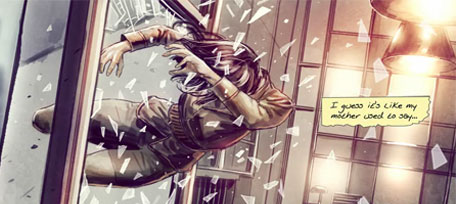Spark-Tower Wilson's Silent Song
Spark-tower Wilson’s Silent Song was created by Jeff Coleman and Stephen Greenwood-Hyde. The story is based on perseverance of people trying to move forward. Although that it is a short read, i found it to be a good read because of the style of first person view of to protagonist.
The story is about Joe’s life in the “yard” and how he feels like being pressed under his father Spark-Tower Wilson’s fame. Due to certain painful circumstance, Joe had the chance to befriend a beautiful woman named Carla. Because of an unexpected event, Joe’s improving life plummets down to the ground causing an inner conflict in Joe. Now Joe must figure out what steps to take solve said inner conflict.
In this novel, the theme, setting and characterization really come together quite well. The theme of perseverance really shaped the whole story. The characters’ personalities does not feel out of place under the harsh and boorish settings of the “Yard”. The creators personalized the characters to be very outspoken and crude young men. The personification is really what a reader would expect out of characters that grew up in a suburban area.
The creators used low tone coloring and rough outlining drawing. These help show how the main character Joe sees and feels his life at the “yard” is like. A dull life with a rough road to walk on is what I picked up on protagonist’s life with just the presentation of the novel.
Overall, this novel was pretty good although the length of the story was a lacking a bit. The contrast between the way the novel is drawn, what is drawn and written really helps the reader feel the characters emotions. I would say that if the a reader is not into emotional novels then this one is not for him or her.


